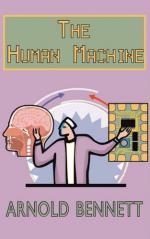The foregoing is meant to be a description of what happens when a man passes through the incendiary experience known as ‘losing his temper.’ (There! the cat of my chapter is out of the bag!) A man who has lost his temper is simply being ‘burnt out.’ His constitutes one of the most curious and (for everybody) humiliating spectacles that life offers. It is an insurrection, a boiling over, a sweeping storm. Dignity, common sense, justice are shrivelled up and destroyed. Anarchy reigns. The devil has broken his chain. Instinct is stamping on the face of reason. And in that man civilisation has temporarily receded millions of years. Of course, the thing amounts to a nervous disease, and I think it is almost universal. You at once protest that you never lose your temper—haven’t lost your temper for ages! But do you not mean that you have not smashed furniture for ages? These fires are of varying intensities. Some of them burn very dully. Yet they burn. One man loses his temper; another is merely ‘ruffled.’ But the event is the same in kind. When you are ‘ruffled,’ when you are conscious of a resentful vibration that surprises all your being, when your voice changes, when you notice a change in the demeanour of your companion, who sees that he has ‘touched a tender point,’ you may not go to the length of smashing furniture, but you have had a fire, and your dignity is damaged. You admit it to yourself afterwards. I am sure you know what I mean. And I am nearly sure that you, with your courageous candour, will admit that from time to time you suffer from these mysterious ‘fires.’
‘Temper,’ one of the plagues of human society, is generally held to be incurable, save by the vague process of exercising self-control—a process which seldom has any beneficial results. It is regarded now as smallpox used to be regarded—as a visitation of Providence, which must be borne. But I do not hold it to be incurable. I am convinced that it is permanently curable. And its eminent importance as a nuisance to mankind at large deserves, I think, that it should receive particular attention. Anyhow, I am strongly against the visitation of Providence theory, as being unscientific, primitive, and conducive to unashamed laissez-aller. A man can be master in his own house. If he cannot be master by simple force of will, he can be master by ruse and wile. I would employ cleverness to maintain the throne of reason when it is likely to be upset in the mind by one of these devastating and disgraceful insurrections of brute instinct.




